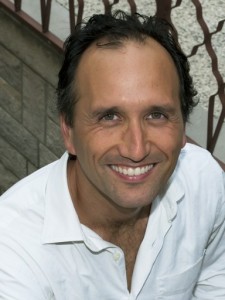Travel writers: Francis Tapon
Francis Tapon was born and raised in San Francisco, California and has traveled to over 75 countries. He co-founded a successful Silicon Valley company, and he has also worked at Hitachi Data Systems and Microsoft. He thru-hiked the Appalachian Trail and the Pacific Crest Trail. In 2007, he became the first person to do a round trip on the Continental Divide Trail. He wrote Hike Your Own Hike: 7 Life Lessons from Backpacking Across America and The Hidden Europe: What Eastern Europeans Can Teach Us
. He has a degree in Religion from Amherst College and an MBA from Harvard Business School.
How did you get started traveling?
Soon after I was born. Although I was born in San Francisco, my mom is from Chile and my dad was from France. Therefore, to see any relatives, we had fly a long way. My first big solo trip was right after college: the classic Western European tour that many college grads do. My first big backpacking trip was thru-hiking the Appalachian Trail.
How did you get started writing?
While I was hiking the Appalachian Trail, I wanted to summarize the lessons I learn from the trail. So I penned my first book, Hike Your Own Hike.
What do you consider your first “break” as a writer?
Getting on to the most-listened to radio station in America: KQED. I was interviewed for one hour on Forum with Michael Krasny. It’s a San Francisco Bay Area radio show that I had listened to many times. I had always admired Krasny’s interview skills and general intelligence. He is a hero of mine. Therefore, I was thrilled to get an hour on his show to talk about The Hidden Europe, my second book.
As a traveler and fact/story gatherer, what is your biggest challenge on the road?
Language barriers. Although I’m fluent in Spanish and French, and I can vaguely understand Portuguese and Italian, there are still hundreds of languages that I can’t speak. It’s frustrating when I meet an old person who I’m sure is filled with fascinating tales and I can’t get those stories out of him or her. I usually find young people to help me translate, but often even young people can’t speak one of my languages. So sometimes I can’t get the story.
What is your biggest challenge in the research and writing process?
Knowing when to stop researching. You can spend your whole life reading and researching almost any subject. At some point, you have to say, “That’s enough, I’m going to start writing.”
The biggest challenge for writing is ignoring the Internet drug. The temptation of wasting hours on the Internet is monumental. The only way I solved it was living in a house in village in Croatia that had a great view of the Adriatic, but no Internet at all. Once a week I would check email. I would also download Wikipedia pages and read them at home. I was disconnected for about one year.
What is your biggest challenge from a business standpoint?
Writing is a horrible way to make money. So from a business standpoint and as a Harvard MBA, I must say that there’s are so many other ways to make money that are far superior than writing. Do NOT do it for the money. Please. In fact, you could lose money just doing the promotion.
Promotion is the toughest part. There’s a common myth that if you just write a brilliant book, you just have to sell it to 100 people and then word-of-mouth will turn it into a bestseller. Then you can sit back and collect checks. Wrong! Excellent writing helps sell the book, but ultimately you have to relentlessly promote it, at least until you have a few thousand of true fans. Not 2,000 Twitter followers or 2,000 Facebook “Likes.” No. You need at least 1,000 rabid, I’ll-buy-and-spread-the-word-of-whatever-drivel-you-write fans. Getting that critical mass is one of the toughest things a successful writer must achieve.
Have you ever done other work to make ends meet?
I saved most of my money during the four years that I consulted for Microsoft and Hitachi. I’ve been living off my savings ever since. My book revenue provides a trickle of revenue that helps, but, so far, is not enough to keep me from tapping into my savings every month.
Fortunately, frugal vagabonding can cost roughly $10,000 a year, so I can avoid “real” work for a long time. I hope that somewhere along the line my book and services (public speaking, guiding, personal coaching) will start producing enough revenue that it will exceed my expenditures so that I can stop digging into my savings every week. That gets old after a few years.
What advice and/or warnings would you give to someone who is considering going into travel writing?
Don’t quit your day job unless you have enough money to sustain yourself for at least three years. Even after you finish writing your book, it takes a long time to publish and promote it. You won’t see revenue for years. And even when the money starts to flow, it’s usually just a trickle and rarely goes beyond that. Do your best to be the exception to this rule, but at the same time don’t bank on being the exception (unless you have a big bank account).
What is the biggest reward of life as a travel writer?
The flexibility and the joy of doing what you love. Everyday someone tells me, “Francis, you’re living the dream.” Amen. I’m profoundly grateful everyday that I’m travel writer.
ft@francistapon.com


Category: Travel Writing